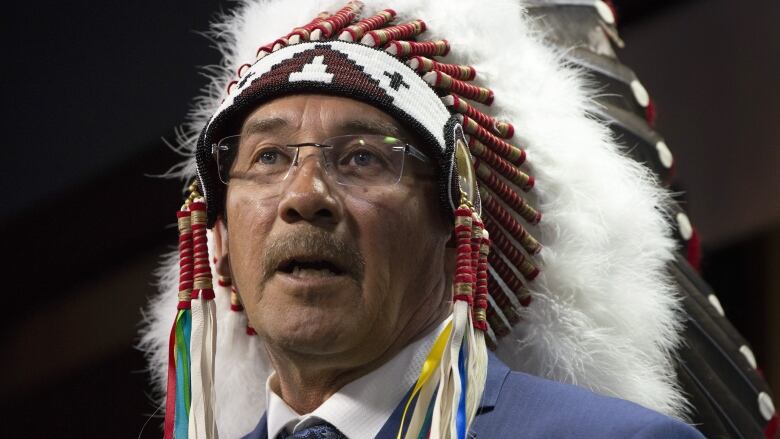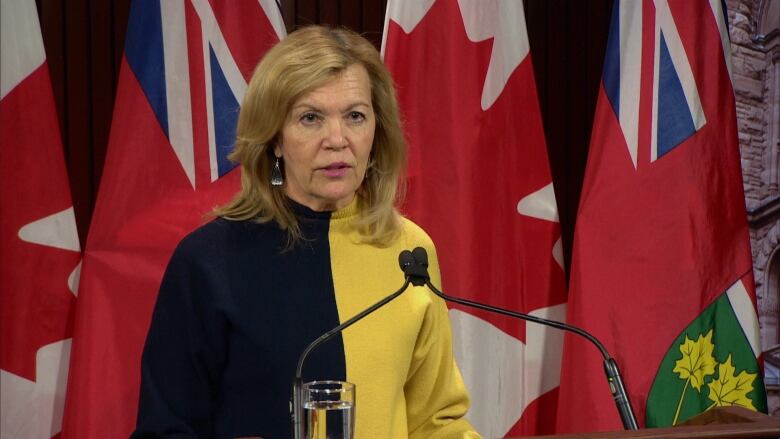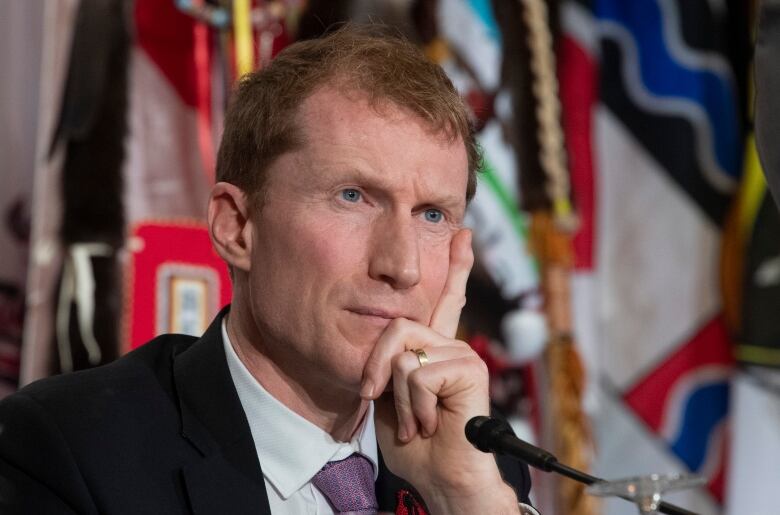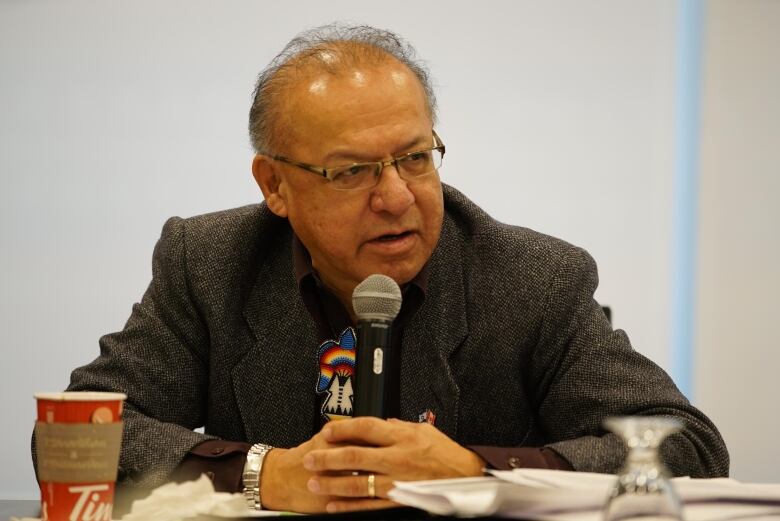Grand Chief says Ontario Health's 'low risk' COVID-19 designation to key hospital puts First Nations at risk
First Nations leaders worry jurisdictional gaps in health delivery could hamper COVID-19 response

A grand chief from Ontario's James Bay region says an Ontario Ministry of Healthdecision to rate a key area hospital as "low risk" for dealing with COVID-19 could curb vital support for the vulnerable population in his communities if hit by anoutbreak.
Mushkegowuk Council Grand Chief Jonathan Solomon said he's been told the provincial health ministry is prioritizing supplies for areas deemed to be high risk, leaving northern First Nations like Kashechewan and Attawapiskat at a disadvantage if the pandemic hits the region.
"I am just appalled and upset," said Solomon.
Solomon wrote federal Indigenous Services Minister Marc Miller and OntarioHealth Minister Christine Elliott on Friday, raising his concerns over the move.
"We want to protect critical care capacity within the context of an already stressed system," wrote Solomon.
With the federal government saying it is ramping up support for First Nations and Inuit communities to prepare for a potential COVID-19 outbreak, Solomon said the First Nations in his region are getting caught by the jurisdictional gaps in the delivery of health services.
"That is what I am afraid of, where there is a jurisdictional bounce-back," said Solomon.
"Who is responsible for what? I hope it doesn't come to that."

Other First Nations leaders in Ontario have also raised concerns about their communities getting caught between jurisdictional gaps in the delivery of health services which are often split between Ottawa and Queen's Park.
Weeneebayko Area Health Authority (WAHA), which serves Ontario's James Bay and Hudson Bay region, gets most of its funding from Ontario along with some federal funds.
WAHA operates a regional hospital in Moose Factory, along withsmaller hospitals in Fort Albany First Nation and Attawapiskat along with a health centre in Moosonee. The federal government funds and operates nursing stations in Kashechewan and Peawanuck, but under the WAHA umbrella.
'Once one person gets COVID-19, it's going to hit the whole family'
Solomon said he was informed Friday morning on a teleconference with WAHA officials that the regional hospital in Moose Factoryreceived a low risk rating for COVID-19 from the provincial health ministry.
"If the hospital is low risk, then they are designating the region as low risk," said Solomon.
Solomon said the First Nations along Ontario's James Bay coast face housing shortages, overcrowding, lack of clean water and minimal infrastructure.
"They don't understand the vulnerability of our communities in the service area," he said.
"Once one person gets COVID-19, it's going to hit the whole family."

Hayley Chazan, a spokesperson for Elliott's office, sent a statement to CBC News Saturday saying the ministry has been holding weekly calls on COVID-19 with the Chiefs of Ontario and Indigenous Services Canada. The statement said that public health units are continually in touch with First Nations in their regions to ensure communities are integrated in pandemic response plans.
It addedthat federal nursing stations operating in First Nations across the province can administerCOVID-19 tests then sendsamples to labs for confirmation and nurses can assess patients to determine whether they should be taken out of the community
Elliott also recently discussed the threat of the pandemic to First Nations in a one-on-one meeting with federal Health Minister Patty Hajdu, the statement said.
"The Ministry of Health will continue to work closely and collaborate with our Indigenous partners and the federal government to ensure information is shared and disseminated to First Nations communities and health workers in a timely manner," the statement said.
CBC News obtained a letter sent by WAHA to Nishnawbe Aski Nation Grand Chief Alvin Fiddler raising concerns about the province's decision to designate the region as a low priority.
"This means that any additional supplies outside of what we ordered are not being filled," said the letter from Lynne Innes, the president and CEO of WAHA.
"Therefore any additional supplies requested to the pandemic will not be sent to us.... Our remote and unique challenges in my homeland need to be considered as we approach flooding, evacuation and [shorter] seasons."
Valerie Gideon, senior assistant deputy minister forthe First Nations and Inuit Health Branch, said the department was aware of the issue andwould be raising it with counterparts in Ontario's ministry.
Gideon said the federal government would step in if the James Bay communities faced shortages of supplies.
"We do offer an additional safeguard measure with respect to a national stockpile we maintain in collaboration with the Public Health Agency of Canada," said Gideon.
Eabametoong First Nation Chief Harvey Yesno said he also has concerns about jurisdictional tangles getting in the way of dealing with an outbreak of COVID-19 in his community of 1,600, which sits about 365 km north of Thunder Bay.
Yesno saidif anyone needed to be hospitalized in his community they would first be flown to the provincial hospital in Sioux Lookout, Ont., which doesn't have the same level of service as the hospital in Thunder Bay.
While Eabametoong has a federally funded health clinic, medevac services are run by the province and lack of co-ordination in the past has sometimes created delays that has led to the death of patients while they waited for transport, said Yesno.
"These are the kinds of things that happen," he said.
"We don't find these things out until we question after the fact the political jurisdictional football between the federal government and the province, that is a big concern of ours."
Gideon said the federal government is working through jurisdictional issues in a special advisory committee that reports to deputy ministers of health across the country. She said there are also talks in place with Indigenous leaders across the regions to create a specific working group to share information on jurisdictional challenges facing remote Indigenous communities in dealing with COVID-19.
"All communities are supported to have pandemic plans in place and to test those regularly," said Gideon.
Yesno said Eabametoong is already making its own plans to deal with an outbreak. The community is working on installing shower stalls in its community hall to turn it into an isolation facility in the event the virus hits the First Nation.
He said they are also prepared to modify a camp used by the school for outdoor education in the event the community hall runs out of space.
"We are not waiting, but we will probably end up needing assistance on materials and supplies," he said.
Yesno said the community needs to ship up beds for their planned isolation centre.

Gideon said the department is prepared to fund any supplies the communities need as they prepare for the worst.
"We would draw on the resources announced by the prime minister this week with respect to supporting communities to address those needs," she said.
Prime Minister Justin Trudeau said this week that of the $1 billion announced to dealwith the pandemic across the country, Indigenous communities could draw from an envelope of $100 million.
Ontario NDP MPP Sol Mamakwa, whose northwestern Ontario riding of Kiiwetinoong includes many remote First Nations including Eabametoong, released a letter on Twitter Friday from doctors in the Sioux Lookout to federal minister Miller calling for an immediate increase in nursing services for the region.
"As the novel coronavirus spreads, the weaknesses in our health system that already impact patient care are about to become all too clear," said the letter, signed by 26 doctors.
"This cannot wait for lengthy study, scrutiny and contingency planning. This is a crisis."












_(720p).jpg)


 OFFICIAL HD MUSIC VIDEO.jpg)
.jpg)



























































































